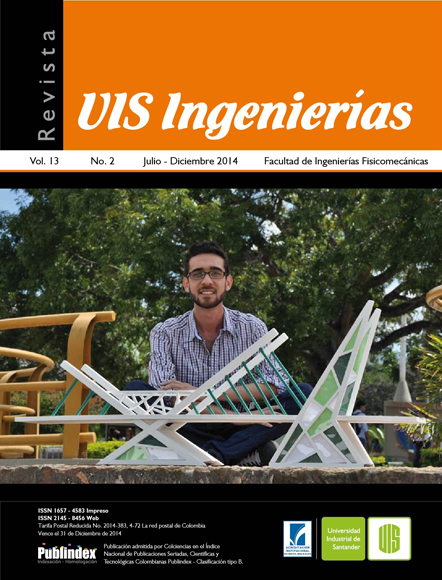Articles
Testing the possibility to manage cooperation in CO2 crisis through mechanisms to face the dependence of the initial condition of trust using a simulation model
Published 2014-06-12
Keywords
- Management of cooperation,
- large-scale social dilemmas,
- mechanisms,
- trust,
- dependence to initial conditions
How to Cite
Parra-Valencia, J. A., Dyner-Rezonzew, I., Serrano, M. C., Pineda-Ballesteros, E., & Lizcano-Dallos, A. R. (2014). Testing the possibility to manage cooperation in CO2 crisis through mechanisms to face the dependence of the initial condition of trust using a simulation model. Revista UIS Ingenierías, 13(2), 7–28. Retrieved from https://revistas.uis.edu.co/index.php/revistauisingenierias/article/view/7-28
Abstract
The mechanism of cooperation based on trust presents dependence to its initial conditions. We tested the possibility to promote and sustain cooperation through a combination of mechanisms using a simulation model in the CO2 crisis. Our results suggest cooperation can be promoted and sustained with our combination of mechanisms. The simulation experiments offer support to our hypothesis about the possibility to manage cooperation in large-scale social dilemmas even if the trust’s initial conditions are not enough to expect high levels of collective action.
Downloads
Download data is not yet available.
References
- OSTROM, E; WALKER, J. Trust and reciprocity: Interdisciplinary lessons from experimental research. Russell Sage Foundation Publications. 2005.
- OSTROM, Elinor. et al. The drama of the commons. National Research Council. 2002.
- OSTROM, E. A behavioral approach to the rational choice theory of collective action. In Polycentric games and institutions: readings from the Workshop in Political Theory and Policy Analysis, (pp. 472). University of Michigan Press. 2000.
- OSTROM, Elinor., et al. Rules, games, and commonpool resources. University of Michigan Press. 1994.
- OSTROM, E. et al. What do people bring into the game? Experiments in the field about cooperation in the commons. Agricultural Systems, 82(3), 307–326. 2004.
- CASTILLO, D; SAYSEL, A. Simulation of common pool resource field experiments: a behavioral model of collective action. Ecological Economics, 55(3), 420– 436. 2005.
- McGINNIS, M; OSTROM, E. Will Lessons from SmallScale Social Dilemmas Scale Up? New issues and paradigms in research on social dilemmas. Berlin: Springer. 189–211. 2008.
- BIEL, A. et al. Norm perception and cooperation in large scale social dilemmas. Resolving social dilemmas: Dynamic, structural, and intergroup aspects. Psychology Press. 245–252. 1999. Intergovernmental Panel on Climate Change-IPCC. Climate Change 2007: Synthesis Report. Ipcc, UN. 2007.
- BUCK, S. The global commons: an introduction. Island Press. 1998.
- STERMAN, J; SWEENEY, L. Cloudy skies: assessing public understanding of global warming. System Dynamics Review, 18(2), 207–240. 2002.
- TANS, P. Data carbon dioxide measured at Manua Loa Observatory, Hawaii. Earth System Research Laboratory. [web en línea]. < www.esrl.noaa.gov/gmd/ccgg/ trends >. [Consulta: 10-7-2013] 2010.
- STERMAN, J. Business dynamics: Systems thinking and modeling for a complex world. Irwin/McGraw-Hill. 2000.
- FORRESTER, J. Industrial Dynamics. MIT press Cambridge, MA. 1961.
- ELSTER, J. Nuts and bolts for the social sciences. Cambridge University Press. 1989.
- MASKIN, E. Mechanism design: How to implement social goals. American Economic Review, 98(3), 567–576.2008.
- SCHELLING, T. The strategy of conflict. Prospectus for a reorientation of game theory. Journal of Conflict Resolution, 2(3), 203. 1958.
- PARRA, J. A. Constructo para la evaluación de la cooperación en dilemas sociales de gran escala. PhD thesis,Universidad Nacional de Colombia. Doctorado en Ingeniería Área Sistemas. 2010.
- MORTHORST, P. The development of a green certificate market. Energy policy, 28(15), 1085–1094. 2000.
- JENSEN, J; RASMUSSEN, T. Allocation of co2 emissions permits: A general equilibrium analysis of policy instruments* 1. Journal of Environmental Economics and Management, 40(2), 111–136. 2000.
- STERMAN, J; SWEENEY, L. Understanding public complacency about climate change: Adults mental models of climate change violate conservation of matter. Climatic Change, 80(3), 213–238. 2007.
- DIEHL, E; STERMAN, J. Effects of feedback complexity on dynamic decision making. Organizational Behavior and Human Decision Processes, 62(2), 198–215. 1995.
- STERMAN, J. Misperceptions of feedback in dynamic decision making. Organizational behavior and Human Decision Processes, 43(3), 301–335. 1989.
- DIEHL, Ernst; STERMAN, John. Effects of feedback complexity on dynamic decision making. Organizational Behavior and Human Decision Processes, 62(2), 198– 215. 1995.
- STERMAN, John. Misperceptions of feedback in dynamic decision making. Organizational behavior and Human Decision Processes, 43(3), 301–335. 1989.

